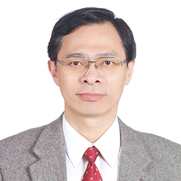|
|
| |
| |
 |
|
Program |
|
| |
|
| |
Section
Time |
[Day 1] 12 November 2015 (Thur.)
|
| Main Auditorium |
Remarks |
| 16:00 ~ 20:00 |
Committee Meeting for ISAAC 2015 & ICACT 2015
Welcoming Dinner
| Chairs |
|
| |
|
| |
Section
Time |
[Day 2] 13 November 2015 (Fri.)
|
Main Auditorium
|
Session 1
|
Session 2
|
Session 3
|
Remarks |
| 09:00 ~ |
Registration Open |
Office |
| 09:00 ~ 09:40 |
Break with Snacks and Drinks |
Office |
| 10:00 ~ 17:00 |
Exhibition |
Office |
| 09:40 ~ 12:00 |
Invited Paper &
Best Paper |
Oral
(OA~OF) |
Oral
(OG)
DCIT, NCC |
Domestic Conference |
Session Chairs |
| 12:00 ~ 13:20 |
Lunch Time |
Session Chairs |
| 13:30 ~ 14:30 |
Poster (PA, PB, PC, PD, PE, PF, PG) |
Session Chairs |
| 14:30 ~ 16:00 |
Invited Paper &
Best Paper |
Oral
(OA~OF) |
Oral
(OG)
AFIT |
Committee Meeting for IIBC
(Closed Meeting) |
Session Chairs |
| 16:10 ~ 17:00 |
Keynote Speech: A New Machine Learning Model for Natural Language Processing - A Principle-based Approach
Professor Wen-Lian Hsu
Distinguished Reserch Fellow of
Institute of Information Science,
Acaemia Sinica |
Session Chairs |
| 17:00 ~ 17:40 |
Welcome Ceremony and Award Ceremony
- Welcoming Remarks : President of IIBC, Chair of ISAAC
- Welcoming Speech
- Best Paper Awards
|
| 18:00 ~ 21:00 |
- Welcoming Performance
- Conference Dinner, Banquet
|
|
| |
|
| |
Section
Time |
[Day 3] 14 November 2015 (Sat.)
|
| Main Auditorium |
Remarks
| 09:00 ~ 09:30 |
Break with Snack and Drink |
Office |
| 09:30 ~ 12:00 |
Invited Paper & Oral (OA, OB, OC, OD, OE, OF, OG) |
Session Chairs |
| 12:00 ~ 13:00 |
Lunch Time |
Office |
| 13:00 ~ 17:00 |
- Industrial Field
- Culture Tour
| Office |
|
| |
|
| |
Section
Time |
[Day 4] 15 November 2015 (Sun.)
|
| (Seminar Room) |
Remarks |
| 09:00 ~ 09:30 |
Break with Snacks and Drinks
| Office |
| 09:00 ~ 12:00 |
Committee Meeting For ISAAC & ICACT 2016 Conference (Closed Meeting)
| Chairs |
|
| |
| |
 |
|
Keynote speaker |
|
| |
|
| |

Professor. Wen-Lian Hsu
Distinguished Reserch Fellow
Institute of Information Science
Acaemia Sinica, Taiwan, Republic of Taiwan
http://iasl.iis.sinica.edu.tw/hsu
Biography
Wen-Lian Hsu is the Director and a Distinguished Research Fellow of the Institute of Information Science, Academia Sinica, Taiwan. He received a B.S. in Mathematics from National Taiwan University, and a Ph.D. in operations research from Cornell University in 1980. He was a tenured associate professor in Northwestern University before joining the Institute of Information Science in Academia Sinica as a research fellow in 1989. Dr. Hsu's earlier contribution was on graph algorithms and he has applied similar techniques to tackle computational problems in biology and natural language. In 1993, he developed a Chinese input software, GOING, which has since revolutionized Chinese input on computer. Dr. Hsu is particularly interested in applying natural language processing techniques to understanding DNA sequences as well as protein sequences, structures and functions and also to biological literature mining. Dr. Hsu received the Outstanding Research Award from the National Science Council in 1991, 1994, 1996, the first K. T. Li Research Breakthrough Award in 1999, the IEEE Fellow in 2006, and the Teco Award in 2008. He was the president of the Artificial Intelligence Society in Taiwan from 2001 to 2002 and the president of the Computational Linguistic Society of Taiwan from 2011 to 2012.
Abstract of Keynote Speech:A New Machine Learning Model for Natural Language Processing - A Principle-based Approach
In natural language processing, an important task is to recognize various linguistic expressions, such as named entity recognition, and relation extraction. Many such expressions can be represented as rules or patterns. These patterns are matched by computer to identify those linguistic objects in text. However, in the real world, there always seem to be many exceptions or variations not covered by rules or patterns. Thus, the inflexibility of rule matching has troubled the natural language processing (NLP) as well as the artificial intelligence (AI) community for years. As an alternative, statistical machine learning language models are more automatic, but they are non-interpretable, and difficult to incorporate fine-grained linguistic knowledge. Therefore, how to make the best out of rule-based and statistical approaches has always been a very challenging task in natural language processing.
In this talk, we present the Principle-based language model, which potentially enjoys the benefits of both approaches. A principle is a representative linguistic template or pattern, which can match a lot of templates through alignment. The alignment score measures the similarity between templates and this principle. Usually, a small number of principles (or dominating templates) are sufficient to represent nearly all the related templates and better yet, they can be generated automatically. Principle-based systems can maintain good precision and recall. The main advantage is that they are interpretable, and can be easily intervened by domain experts. In this talk, we shall illustrate their power in various applications.
|
| |
|
|
|
|
Copyright (c) The Institute of Internet, Broadcasting and Communication. All rights reserved. Business Registration No. : 220-82-04208
Address : 610 Dongbu Sunville, #99-6 GaRak-dong, SongPa-gu, Seoul, Korea |
Tel : +82-2-407-7718, +82-70-7404-7718, Fax : + 82-2-407-7716 E-mail: iibc@iibc.kr |